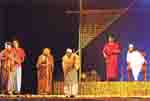War Of Independence
An inexhaustible well for theatre activists
 The war of independence, with all its glory and loss, courage and suffering, has been an inexhaustible well of stories for the theatre practitioners of the country, say theatre activists. No other historical event has provided local theatre practitioners with such a treasure to exploit for theatre productions.
The war of independence, with all its glory and loss, courage and suffering, has been an inexhaustible well of stories for the theatre practitioners of the country, say theatre activists. No other historical event has provided local theatre practitioners with such a treasure to exploit for theatre productions.
Till date, hundreds of plays have been produced, influenced by or based on the country’s historic struggle for independence in 1971. Different parts, known and imagined stories of struggle, loss, horror, patriotism, valour and determination of that time have come to sway theatre productions over the last four decades.
‘Many of our best plays are based on the war of independence directly or in modifications. There are many plays too that address the theme of independence, not necessarily the war of independence; but they are surely an upshot of the country’s historical feat that we achieved in 1971’, said thespian Ataur Rahman.
Rahman also shares that we have got classic plays like Payer Awaj Pawa Jai, penned by poet-playwright Syed Shamsul Haque, which possesses all elements of a great play.
The play Payer Awaj Pawa Jai delineates the tragic story of a rural woman during the liberation war, whose father is the chief of her village. The father bestows shelter to the Pakistani Army for the sake of religion and patriotism towards Pakistan and gives away his daughter to one of the army officers in fear of getting killed. The play evokes the prevailing fear of every soul at that time, the hopelessness and desperation of unarmed common people for survival in the face of heavily armed occupying forces.
This is one facet of the multi-facetious war of independence. Other facets of the war of independence have also been explored and depicted in other plays. One such play is theatre troupe Shunyan’s Laal Jamin.
Written and directed by Mannan Hira and Sudip Chakroborthy respectively, Lal Jamin depicts a touching account of a young girl’s struggles during the war of independence. The story begins with the young girl’s carefree days which come to an end when the war breaks out and her father joins the freedom fighters. The play shows the girl’s eventual joining in the fight for freedom, too.
Women’s involvement and suffering in the war of independence have aslo been movingly addressed in plays like Bideho. Written and directed by Shahman Maishan and Lucky Enam respectively, Bideho is a play with an aching story of two biranganas (war-heroines) living on the river sand of the Meghna. These two war-heroines Halima and Shantikumary are of two different religions-Islam and Hinduism respectively. Their beliefs and ways of lives are, therefore, different. Yet they are alike in their suffering and misery, pains and afflictions.
‘Theatre activists of today, of the new generations, I am happy to say, are quite conscious of the country’s history. Their depictions of the war of independence in plays are no less competent than their predecessors’, said Lucky Enam, who has also directed Sei Sab Din Guli, a noted play on war of independence, written by Enamul Haque.
Another thespian Mamunur Rashid also shared his feelings of working on war of independece. ‘As a theatre practitioner, I have had to repeatedly turn to liberation war for more reasons than one’, said Rashid who had written and directed remarkable plays on liberation war like Joy Joyonti and Target Platoon.
‘We are sons of the war of independence. It is in our immediate experience. The cruelty and suffering of people during the war still haunt many of us. Similarly the courage of our people inspires us to tell and present their stories to the world’, added thespian Mamunur Rashid.
In his Target Platoon, Rashid has portrayed activities of a group of freedom fighters, which includes different professionals like cook, doctor, student, and others who plan to create a guerrilla force to obstruct the advancement of Pakistani invading army. The play demonstrates how people from all walks of life united to fight for the freedom of their motherland.
Mamunur Rashid thinks that more poignant plays on war of independence will be produced in times to come.
Thespian Nasir Uddin Yusuff also shares somewhat similar expectations. ‘We have many plays on the war of independence. But there are only two or three that can be said to have the qualifications of great plays. I hope more quality plays will be produced on war of independence in the future’, said Yusuff.
-With New Age input




















